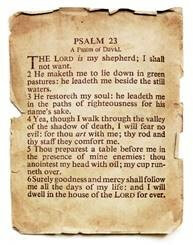5_23 E-Votional
This Sunday our focus in worship will be Psalm 23. Not only is this the favorite passage of our congregation (based on the surveys you submitted to me over the past few weeks); not only are the opening lines of this psalm the most easily quotable by Americans of all the passages in scripture; we tend to prefer hearing or reading Psalm 23 from the King James Version of the bible – “…yea though I walk through the valley of the shadow of death…”

When James ascended to the throne in 1603 he was the sixth King James of Scotland but the first King James of a United Kingdom (England, Ireland and Scotland). His attempt was to unify this kingdom and the religious strife taking place within it. Over the previous 50 years, there were disputes among Catholics (those who were still sympathetic to the pope); Anglicans (those who favored an English church independent of the pope’s influence); and Puritans (radicals who wanted a complete and total break from anything that looked or sounded “catholic”). There were also different versions of the bible being used by each group. Catholic sympathizers favored the Latin Vulgate; Anglicans the “Bishop’s bible;” and Puritans the “Geneva bible” of John Calvin.
One of the first things James did was commission over 45 scholars to prepare a new version of the bible that would help unify the kingdom and the religious understandings and practices therein. What resulted was what we now call the King James Version, written over the years 1604-1611.
When the Puritans first settled in America in 1620, they brought with them their favored “Geneva bible.” But by the 1700s, when the colonies were under the complete control of England, the bible primarily used was the King James Version. No printing of bibles was done in the colonies, rather all bibles were shipped over from England, which by this time was exclusively printing the KJV. In the 1770s, with trade disputes between England and the colonies reaching a high point, bibles were hard to come by with shipments from England being delayed or even stalled. Colonists received permission to print bibles on our side of the Atlantic and the version permitted was, of course, the King James Version. Over the next few decades, the KJV became known as the “bible of the revolution” by Americans and from that point on, it was the most popular version in America, with settlers taking it with them as they continued to travel further west.
I have always been intrigued that Psalm 23 is so popular at funerals. Of the more than 170 I have officiated in my 20-year ministry career, only once have I not been asked to read Psalm 23. But even more, I’m fascinated how, though we never read from the KJV in our regular Sunday services, when church members are planning funerals, they often request the KJV for the reading of Psalm 23.
I suppose there may be three reasons for this, though this is merely conjecture on my part. First, as described above, the KJV is deeply intertwined with the development of our nation. Second, the KJV is truly a work of poetic art, as it was designed from its inception to be something that was not merely communicating God’s word, but also pleasing to the ear. Simply put, the KJV sounds different from the way we speak in our everyday communication. It sounds other-worldly and mysterious, and therefore, perhaps subconsciously, we deem it somehow worthy of God. Finally, from a personal standpoint, it may have been the bible our grandparents used. As they taught us the faith, we associate this version with our deepest spiritual roots and thus have an emotional connection to these words which are awakened at significant times in our lives such as funerals.
This Sunday, I’ll be shifting back and forth from the KJV and newer translations, which are likely more accurate in terms of capturing the meaning of the original language of biblical Hebrew. Regardless of how it is translated, however, the meaning of Psalm 23 is powerful and I hope you find that to be communicated in worship this Sunday. Hope to see you there!
